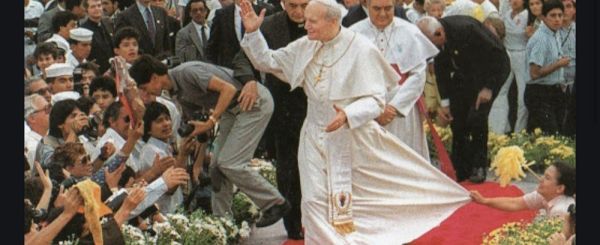1. "I am the living bread" (Jn 6:51). In the desert, the Apostles say to Jesus: "Dismiss the crowd" (cf. Lk 9, 12). This crowd followed the Master, listening to his words about the Kingdom of God; but by now the night and the hour of supper were approaching. The crowd stood there in silence and expectation. Already at one time in the wilderness, when there was a shortage of bread, the children of Israel had rebelled against Moses. They had then received the food, which fell every morning on the camp, and called it "manna". Thus the people, coming from the land of Egypt, had been able to continue their journey from the region of slavery to the promised land. Now Jesus says to the Apostles: "Give them something to eat yourselves" (Lk 9:13), and since they cannot find any solution, Christ multiplies the loaves: he blesses what little they have, breaks it and gives it to the disciples; and these, in turn, to the people. "They all ate and were satisfied".
2. The multiplication of the loaves in the desert is an announcement, as was the manna The crowds follow Jesus when they experience his power over food and human hunger. They are even ready to proclaim him king. Does not the Psalm of David speak of the Messiah's rule and the day of his triumph? "To thee the principality," it says, "in the day of thy power" (cf. Ps 110:3). At the same time, the same Psalm calls the royal Messiah a Priest: He is a Priest forever in the manner of Melchizedek (cf. Ps 110:4). Melchizedek was both king and Priest of the Most High God. Unlike the priests of the Old Covenant, he offered to God not the blood of immolated animals, but bread and wine.
3. The multiplication of the loaves in the desert is, therefore, a prophetic message: Christ knows that He Himself will one day fulfil the prophecy contained in the sacrifice of Melchizedek. As the Priest of the New Covenant - of the Eternal Covenant - Jesus will enter the eternal sanctuary, having accomplished the work of the Redemption of the world by His own blood. To the Apostles in the Upper Room he gave in essence, once again, the same command: "Feed him yourselves! - Do this in memory of me!" There are different categories of hunger, which torment the great human family. There was the hunger that turned entire cities and towns into graveyards. There was the hunger of the death camps, produced by totalitarian systems. In various parts of the globe there is still the hunger of the third and 'fourth' world: there starve men, mothers and children, adults and the elderly. The hunger of the human organism is terrible, the hunger that exterminates. But there is also the hunger of the soul, of the spirit. The human soul does not die on the paths of present history. The death of the human soul has another character: it takes on the dimension of eternity. It is the "second death" (Rev 20:14). By multiplying the loaves for the hungry, Christ placed the prophetic sign of the existence of another Bread: 'I am the living bread, come down from Heaven. If anyone eats of this bread, he will live forever" (Jn 6:51).
4. Here is the great mystery of faith. The same people for whom Christ multiplied the loaves, those who "ate and were filled" (Lk 9:17), were, however, unable to believe his words when he spoke of the food that is his Flesh, and the drink that is his Blood. For this, the same people later asked for his death on the cross. So it came to pass. And when all was fulfilled, the mystery of the Last Supper was revealed: 'This is my body, which is for you . . . This cup is the new covenant in my blood" (1 Cor 11: 24-25). Out of the Upper Room came the Priest "in the manner of Melchizedek". He now walks with his people through history.
5. Such is the content that the Solemnity of Corpus Christi intends to express, and which we wish to proclaim with this Eucharistic procession through the streets of Rome, from the Basilica of the Most Holy Saviour in the Lateran to the Marian Basilica on the Esquiline Hill. "Ave verum Corpus natum de Maria Virgine". The way we walk becomes a concrete image of the many other ways of the Church in today's world. The Bishop of Rome, servant of all servants of the Eucharist, follows with thought and heart all those who bear witness to this Mystery today, from north to south, from sunrise to sunset. Everywhere where the People of God of the New Covenant are found, there is also Him, "the living bread, come down from heaven".
Everywhere. "If anyone eats of this bread, he will live forever."
[Pope John Paul II, Corpus Christi homily 18 June 1992]


